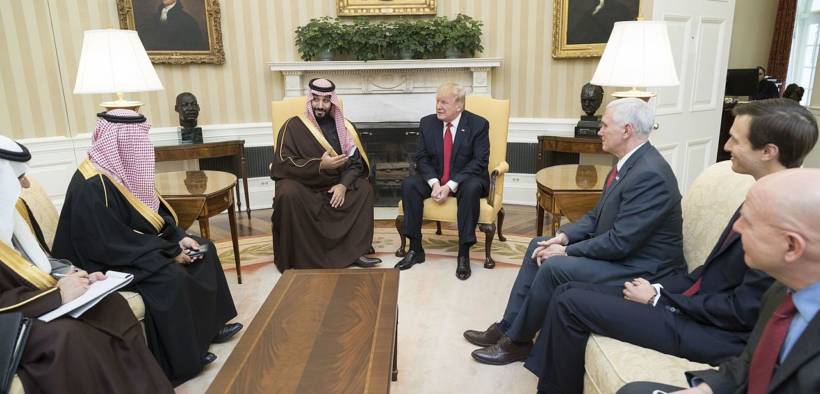Whistleblower Alleges Saudi Arabia, UAE Illegally Donated to Trump Campaign

“I’ve been meeting with the Trump campaign people…we have a deal with Trump: my boss, His Highness, made a deal that if we help Trump get elected, he’s going to be harsh on Iran, he’s going to take out the nuclear deal that the Obama administration made.”
A Lebanese-American has accused Saudi Arabia and the United Arab Emirates of illegally funding President Donald Trump’s 2016 campaign. Ahmad “Andy” Khawaja, the CEO of online payment processor Allied Wallet, described to Spectator magazine how the Arab monarchies used his payment technology to make micro-transactions toward Trump’s election. Furthermore, Khawaja alleged the governments used stolen identities gleaned from data purchased from China.
Khawaja’s account of how the scheme played out also implicated George Nader, a key witness in the Special Counsel investigation of Russian interference in the 2016 election. Both men were indicted by a grand jury in the investigation, Khawaja for making false statements, obstruction of justice, and making $3.5 million worth of illegal campaign donations to Hillary Clinton, Al Jazeera reported. Nader is also a recently-convicted pedophile and awaiting sentencing.
Money In Exchange for Political Favors
Khawaja’s role in the story was simply as a provider for the payment processing system, which Crown Prince Mohammed bin Zayed (MbZ) of Abu Dhabi purchased for the operation. Nader was the point man for coordinating the logistical side of the operation. Khawaja and Nader were previous acquaintances when Khawaja was seeking financing to build an online version of Amazon for the Middle East in 2016 ($500 million of funding was promised by MbZ, but never arrived).
In September 2016, Nader reconnected with Khawaja asking for advice in relation to campaign donations, Khawaja said.
‘How can we generate electronic payouts to the online donation websites? I would like you to show us how we would be able to do that,” Khawaja recalled.
Critically, Nader, working on behalf of Saudi Arabia and the UAE, wanted a method that could handle bulk transactions of $200 or less, which would prevent the campaign from having to report them to the Federal Election Commission. In exchange for helping elect Trump, the president would work to cripple Tehran and Qatar for the Middle Eastern benefactors.
“I’ve been meeting with the Trump campaign people…we have a deal with Trump: my boss, His Highness, made a deal that if we help Trump get elected, he’s going to be harsh on Iran, he’s going to take out the nuclear deal that the Obama administration made,” Nader told Khawaja. “That will cripple the Iranian economy and will sanction Iran from selling oil again. It will make it very difficult for them to compete in the oil market. That’s worth a hundred billion dollars to us. That’s the reason we cannot allow Hillary to win at any cost. She must lose.”
Nader also included another condition of Trump supporting the blockade against Qatar, which he did end up backing in June 2017. Khawaja told Spectator he walked away from the operation while development of the payment engine was still ongoing. Nader, he said, would be tasked with completing it on his own, and by Khawaja’s account, he finished it.
Khawaja provided Nader with a couple tickets to inaugural festivities and, when the two met there, Nader told him “a few hundred million” was poured into the plot to elect Trump. Nader also said he believed the payments are still continuing.
Trump’s first foreign trip as president was to Saudi Arabia, as Nader predicted, to celebrate their achievement, Khawaja said
Denials All Around
Khawaja said he received $5 million of the $10 million agreed upon price for developing the payment system.
The US Department of Justice disagreed on the intention behind the payment, however. It alleges the money, sent from Nader, was for the illegal campaign donation to Clinton.
“In 2016, I made $43 million. You think I need a fucking $3 million from this guy? Why would George need to give me even one dollar to give to Hillary Clinton? He’s a US citizen. He can do it himself. I made a deal with George and he bought a product from me. I never lobbied for anyone, I never took any money from a foreign leader. Never.” Khawaja responded.
The Republican National Committee also denied the theory, telling Spectator that the Stripe credit processing service the Trump campaign used can detect fraudulent transactions. It saw no evidence of such transactions.
However, Khawaja has enough knowledge of online payment processing that he has built his own company in the industry, one that recently paid a $110 million judgement for processing fraudulent online transactions. Khawaja denied that Allied Wallet processed the transactions and accused the federal government of unfair persecution.
“The law has been manipulated,” he said.
There are valid reasons to doubt Khawaja’s claims of Saudi Arabia and the UAE making illegal donations, but two other sources supported his account. An unnamed businessman in Beirut told Spectator that he was also approached by Nader to sell a credit card processing system.
A longtime friend of Nader also alleged Nader top him about the scheme, repeating many of the same details Khawaja recounted.
Nader had the political connections and Khawaja had the know-how. Washington has chosen to ignore the claims, however. Khawaja has asked the FBI to investigate to no avail (although the FBI routinely does not confirm or deny active investigations). He also spoke with elected officials and a National Security Council member. Without a proper investigation, it seems Khawaja’s allegation will amount to nothing as his detractors attack his credibility following his indictment and his company’s legal woes.









